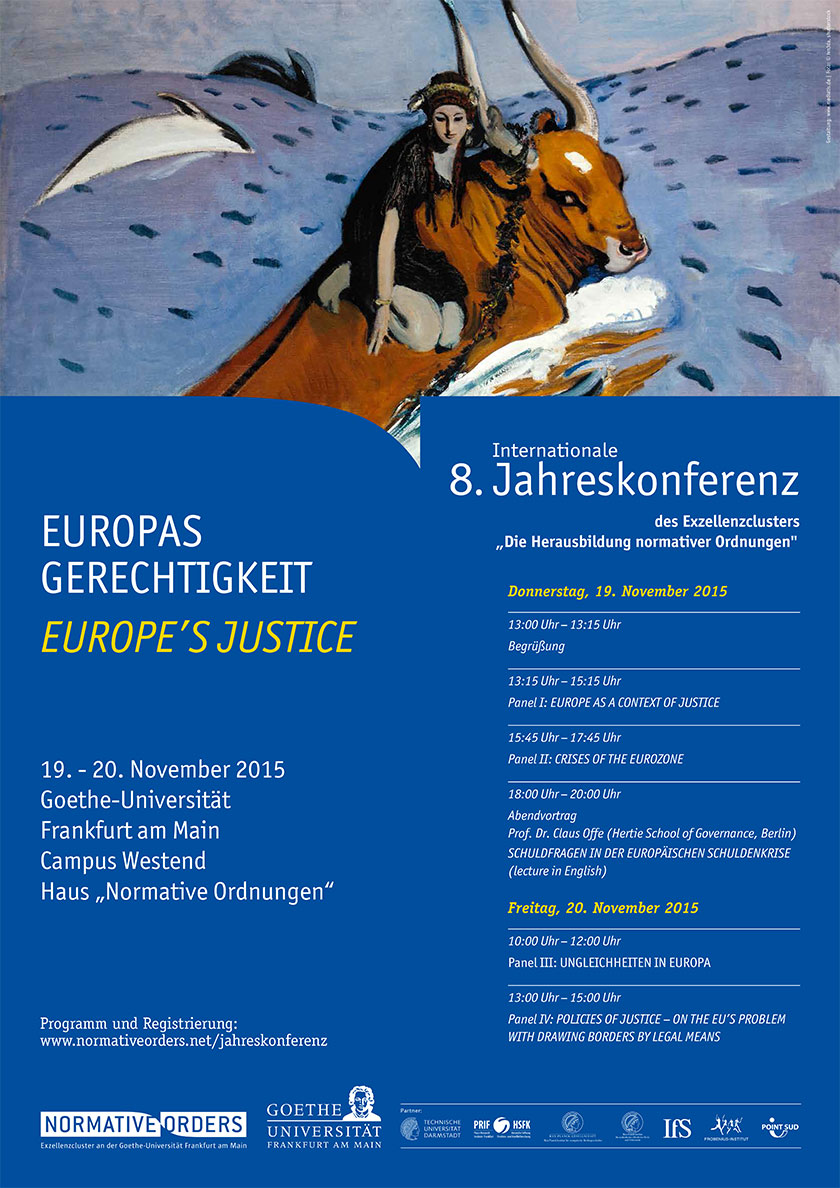Europe’s justice
Eighth Annual International Conference of the Cluster of Excellence “The Formation of Normative Orders”
Program
Thursday, November 19
13.00 to 13.15
Opening of the Annual Conference 2015: EUROPE’S JUSTICE
Welcome: Prof. Dr. Klaus Günther & Prof. Dr. Rainer Forst (Speaker of the Cluster of Excellence “The Formation of Normative Orders”)
13.15 to 15.15
Panel I: EUROPE AS A CONTEXT OF JUSTICE
Chairs: Prof. Dr. Rainer Forst & Prof. Dr. Klaus Günther (Speaker of the Cluster of Excellence “The Formation of Normative Orders”)
Prof. Dr. Kalypso Nicolaïdis (Oxford University): How can a Demoicratic Polity be Just? The Puzzles of Solidarity, Reciprocity and Choice in the EU
Dr. Lisa Herzog (Goethe University): Prices and Dignity in the Eurozone
Prof. Dr. Christoph Burchard (Goethe University): The Contexts of Europe as a Context of Justice – in Light of the Administration of Criminal Justice
3:15 p.m. to 3:45 p.m., foyer on the first floor
Coffee and cake
3:45 pm to 5:45 pm
Panel II: CRISES IN THE EUROZONE
Chairs: Rebecca Caroline Schmidt (Managing Director of the Cluster of Excellence “The Formation of Normative Orders”) & Prof. Dr. Rainer Klump(University of Luxembourg)
Prof. Dr. Francesco Mongelli (ECB, Goethe University) & Jean-Francois Jamet (ECB): How to Exit the Crisis: Reflections on the 4 Unions. Why Do We Need Them?
Prof. Dr. John Milios (National Technical University of Athens): Crisis and Austerity. Is there a Chance for the Welfare State?
Dr. Kolja Möller (Goethe University): From the Constitutionalization of Austerity to Destituent Power: Democratic Challenges in the Context of the Euro-Crisis
18:00 to 20:00
Keynote: Questions of guilt in the European debt crisis
Evening lecture
Prof. Dr. Claus Offe (Hertie School of Governance, Berlin)
Friday, November 20
10:00 to 12:00
Panel III: INEQUALITIES IN EUROPE
Chair: Dr. Dominik Müller (Goethe University)
Prof. Dr. Hartmut Kaelble (Humboldt University Berlin): Why did social inequality in Western Europe decrease during the 20th century?
Prof. Dr. Susanne Schröter (Goethe University): Justice in the immigration society
Dr. Kerstin Weiand (Goethe University): Inequality as a political-social explosive? On the (dis)order function of a structural principle in the early modern period
12:00 to 13:00, Room 5.01 and Lounge
Small lunch snack
13:00 to 15:00
Panel IV: POLICIES OF JUSTICE – ON THE EU’S PROBLEM WITH DRAWING BORDERS BY LEGAL MEANS
Chair: Prof. Dr. Stefan Kadelbach (Goethe University)
Prof. Dr. Helene Sjursen (Arena Centre for European Studies, Oslo): A Duty to Expand? The Question of Obligations Towards “the Other” in a European Context
Prof. Dr. Harald Müller (Peace Research Institute Frankfurt): International Political Justice in Europe: The Distribution of Security and Opportunity for Influence in Security Policy
Dr. Michael Ioannidis (Max Planck Institute Heidelberg): Weak Members and the EU Rule of Law: The Case of Greece
15:00
End of the 2015 annual conference



